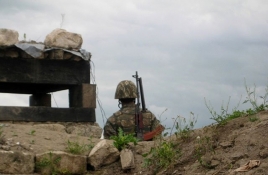Warning from Yerevan and U.S. to Baku: Temptation May Be Fatal
Monday, February 25, 2019
The Defense Army of Artsakh has dismissed the February 21 rumors on the destruction of an Armenian drone. In addition, the message hints that Baku spread rumors at the time of the visit of the Minsk Group co-chairs to Azerbaijan.
The three co-chairs were in Yerevan before this. Details of this regional visit are scarce though, according to known information, the co-chairs are trying to organize a Pashinyan-Aliyev meeting. Two earlier meetings in Dushanbe and Davos were informal.
The Azerbaijani president Aliyev recalled the militaristic rhetoric a few days after Davos and stated that Baku has advantage in negotiations and in the military and will resolve the problem with weapon if need be.
Reactions to the Davos meeting in Armenia were interesting. Pashinyan’s opponents made judgments based on photos or the video, referring to Aliyev’s confident posture.
Meanwhile, by returning to the militaristic rhetoric Aliyev gave away his dissatisfaction, not self-confidence. Because, if the process is going on the way as to explain his smile and pleased look that he put on in front of the cameras in Switzerland, the question occurs, why the Azerbaijani president would have needed to hinder that process? He would have kept quiet and continued to looked self-confident.
However, Aliyev moved on to militarism, which was but an attempt at blackmail, an attempt to restore the military blackmail. And that was taking place in the context of the clear messages that Baku received from the American and Russian co-chairs. A week after Davos John Bolton called him and said that the United States supports the peace process and on the same days the Russian deputy minister of foreign affairs stated that the international community has consensus over preventing a military solution. Those were messages to Baku.
Israel came to rescue Israel, stating to renew the license for selling drones. This statement followed Prime Minister Pashinyan’s visit to Germany where Angela Merkel described Pashinyan’s policy on Artsakh as brave, and during the same visit the Armenian prime minister stated about his intention to visit Iran on February 27.
A week later Armenia announced about the start of the humanitarian mission to Syria ahead of the Russia-Iran-Turkey summit on Syria in Sochi where the situation after the withdrawal of American troops from Syria was to be discussed.
Aliyev’s attempt at military blackmail came along this shuttle, determined by not only the Artsakh process but a fear to be left out of a wider process, trying to remind of himself.
In this context, the information about destroying an Armenian drone was Aliyev’s effort to return to the game or not to be left out of the game which he put on the table of co-chairs as an argument.
However, this was followed by two interesting statements, one from the United States, the other from Armenia. The former American co-chair of the Minsk Group Richard Hoagland announced that Lavrov’s plan was declined by both sides and Pashinyan represents the new generation in Armenia, apparently hoping that Azerbaijan is dealing with new Armenia for which Lavrov’s plan based on the principles of Madrid is already old. Hoagland hinted that Azerbaijan missed the chance.
Aliyev also understands this whose actions are evidence to this. At the same time, however, it means that Aliyev who missed the train may try to catch the train by causing tension. Of course, it would hardly be rational of him but it is hard to foresee the state of mind of the Azerbaijani president though in case of a militaristic rhetoric Azerbaijan will be punished, irreversibly.
In this context Tevan Poghosyan’s statement is interesting. He said that over the past six months of relative peace Azerbaijani gunshots are heard but there is no answer from the Armenian side, and the latest conscripts do not know the smell of gunpowder and may be scared at the front line, which has risks in it. On the one hand, Poghosyan’s note appears to be an alert. On the other hand, it is a diplomatically disguised hint to Azerbaijan in the form of growing public attention that the Armenian side is on the watch and the temptation to make use of this may be highly risky. Tevan Poghosyan’s note is interesting because he is adviser to the Armenian President Sarkissian who was attending Munich Security Conference and appeared in the world press with a talk with Joe Biden, the ex-vice president of the United States.
And Aliyev knows very well who Joe Biden is and what he knows about the four-day war in April.
https://www.lragir.am/en/2019/02/24/71087





